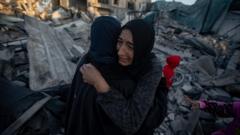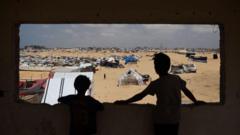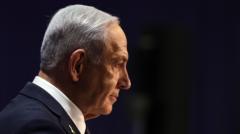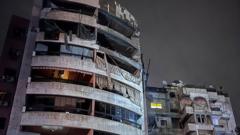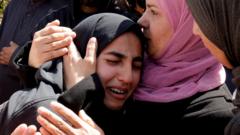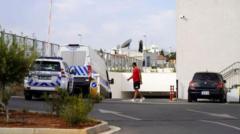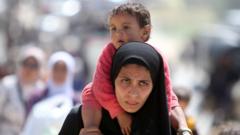The Israeli military conducted a strike near Beirut, increasing tensions as fears grow over the potential collapse of a recently agreed cease-fire with Hezbollah.
Israeli Strikes Continue in Beirut, Complicating Cease-Fire Prospects

Israeli Strikes Continue in Beirut, Complicating Cease-Fire Prospects
Escalating hostilities threaten the fragile truce in Lebanon
In an alarming escalation, the Israeli military reported that it struck the Dahiya area in southern Beirut early Tuesday, marking the second offensive near Lebanon's capital within a week. This uptick in violence raises significant concerns about the sustainability of a cease-fire established in November, which had offered a glimmer of hope for the end of Lebanon’s intense hostilities.
The Israeli military claimed the recent assault targeted a Hezbollah operative accused of facilitating a planned attack by Hamas against Israel. Describing the individual as an “immediate threat,” the military justified its actions via social media, while Dahiya is noted as a vital Hezbollah stronghold.
Previously, on Friday, the Israeli military had executed airstrikes in the same vicinity that resulted in multiple fatalities, reportedly without differentiating between civilian casualties and combatants, according to the Lebanese Health Ministry. These strikes followed rocket fire directed at northern Israel from Lebanese territory, although Hezbollah argued they were not responsible and reaffirmed its adherence to the cease-fire.
In the broader context, tensions surged after Hamas’s considerable offensive against Israel on October 7, 2023, which resulted in an expanded conflict involving Hezbollah's intervention. The situation continues to evolve, indicating that both regional and international perspectives will closely monitor developments in this precarious landscape.
As the standoff persists, the international community remains concerned about the implications of these confrontations and the fateful balance of power in the region.
For more insights from Yan Zhuang, a Times reporter based in Seoul covering breaking news, please follow the ongoing situation regarding Hezbollah and the Israel-Hamas conflict.
The Israeli military claimed the recent assault targeted a Hezbollah operative accused of facilitating a planned attack by Hamas against Israel. Describing the individual as an “immediate threat,” the military justified its actions via social media, while Dahiya is noted as a vital Hezbollah stronghold.
Previously, on Friday, the Israeli military had executed airstrikes in the same vicinity that resulted in multiple fatalities, reportedly without differentiating between civilian casualties and combatants, according to the Lebanese Health Ministry. These strikes followed rocket fire directed at northern Israel from Lebanese territory, although Hezbollah argued they were not responsible and reaffirmed its adherence to the cease-fire.
In the broader context, tensions surged after Hamas’s considerable offensive against Israel on October 7, 2023, which resulted in an expanded conflict involving Hezbollah's intervention. The situation continues to evolve, indicating that both regional and international perspectives will closely monitor developments in this precarious landscape.
As the standoff persists, the international community remains concerned about the implications of these confrontations and the fateful balance of power in the region.
For more insights from Yan Zhuang, a Times reporter based in Seoul covering breaking news, please follow the ongoing situation regarding Hezbollah and the Israel-Hamas conflict.



